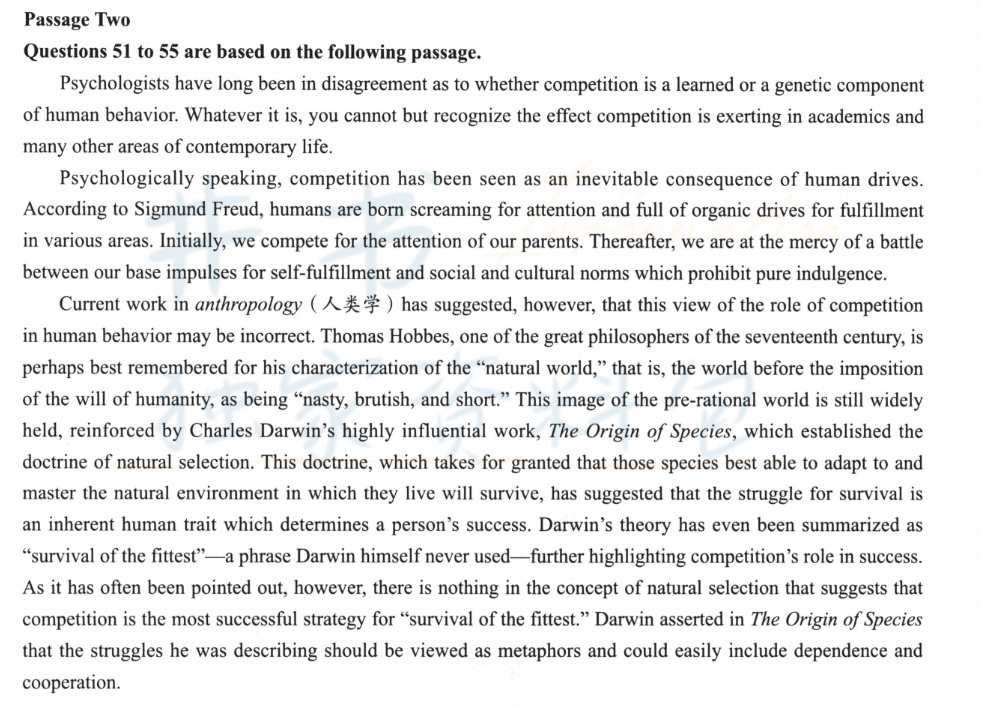QQ扫一扫联系



51. What does the author think is easy to see in many areas of contemporary life?
A) The disagreement on the inevitability of competition.
B) The consequence of psychological investigation.
C) The effect of human drives.
D) The impact of competition.
52.According to psychology, what do people strive to do following the initial stage of their life?
A) Fulfill individual needs without incurring adverse effects of human drives.
B) Indulge in cultural pursuits while keeping their base impulses at bay.
C) Gain extensive recognition without exposing pure indulgence.
D) Satisfy their own desires while observing social conventions.
53. What do we learn about the“natural world” characterized by Thomas Hobbes?
A) It gets misrepresented by philosophers and anthropologists.
B) It gets distorted in Darwin's The Origin of Species.
C) It is free from the rational intervention of humans.
D) It is the pre-rational world rarely appreciated nowadays.
54.What can we conclude from Darwin's assertion in The Origin of Species?
A) All species inherently depend on others for survival.
B) Struggles for survival do not exclude mutual support.
C) Competition weighs as much as cooperation as a survival strategy.
D) The strongest species proves to be the fittest in natural selection.
55. What conclusion did Margaret Mead reach after studying dozens of different cultures?
A) It is characteristic of humans to be competitive.
B) Americans are uniquely opposed to cooperation.
C) Competition is relatively more prevalent in Western societies.
D) People's attitude towards competition is actually culture-bound.
51. What does the author think is easy to see in many areas of contemporary life?
A) The disagreement on the inevitability of competition.
B) The consequence of psychological investigation.
C) The effect of human drives.
D) The impact of competition.
D
52.According to psychology, what do people strive to do following the initial stage of their life?
A) Fulfill individual needs without incurring adverse effects of human drives.
B) Indulge in cultural pursuits while keeping their base impulses at bay.
C) Gain extensive recognition without exposing pure indulgence.
D) Satisfy their own desires while observing social conventions.
53. What do we learn about the“natural world” characterized by Thomas Hobbes?
A) It gets misrepresented by philosophers and anthropologists.
B) It gets distorted in Darwin's The Origin of Species.
C) It is free from the rational intervention of humans.
D) It is the pre-rational world rarely appreciated nowadays.
54.What can we conclude from Darwin's assertion in The Origin of Species?
A) All species inherently depend on others for survival.
B) Struggles for survival do not exclude mutual support.
C) Competition weighs as much as cooperation as a survival strategy.
D) The strongest species proves to be the fittest in natural selection.
55. What conclusion did Margaret Mead reach after studying dozens of different cultures?
A) It is characteristic of humans to be competitive.
B) Americans are uniquely opposed to cooperation.
C) Competition is relatively more prevalent in Western societies.
D) People's attitude towards competition is actually culture-bound.